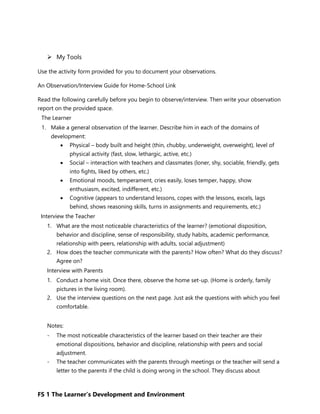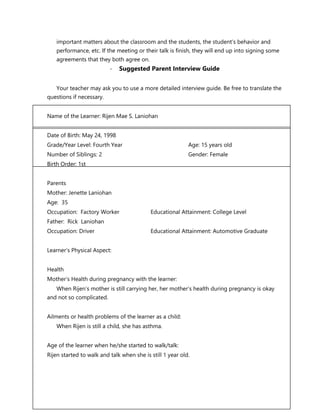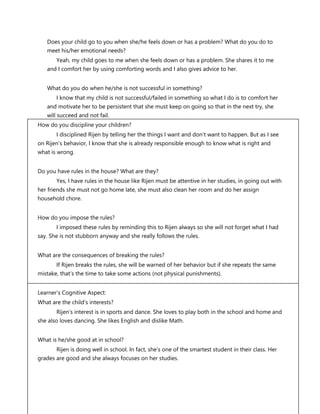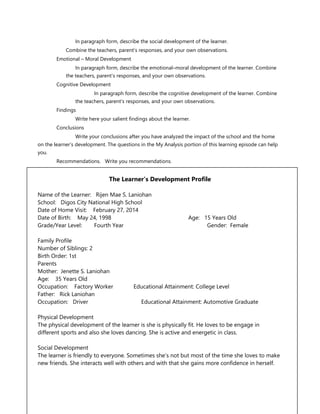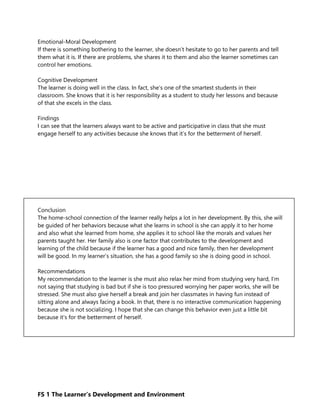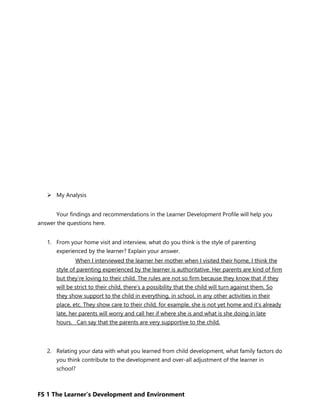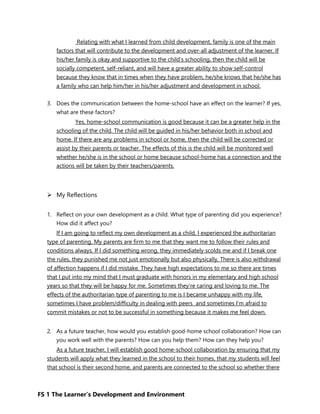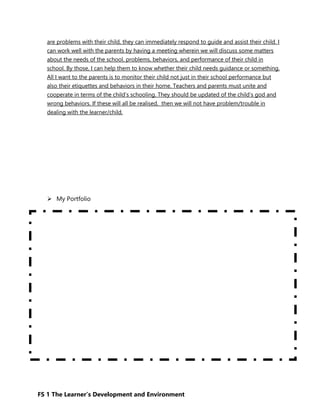Field Study 1, Episode 6 "Home – School Link"
- 1. FS 1 The Learner’s Development and Environment FS 1 The Learner’s Development and Environment Episode 6 HOME – SCHOOL LINK Name of FS Student: Ruschelle L. Cossid Course: BSED - ENGLISH Year & Section: 1st Year Resource Teacher: Mrs. Rowena Magdayao Date: February 28, 2014 Cooperating School: Digos City National High School My Maps To reach your target, do the following tasks: Select a learner from the class whom you have observed. Interview the teacher about the learner’s characteristics. Conduct a home visit to your selected learner’s residence. Interview the parents about - The rules they implement at home concerning their child’s schooling. - The learner’s activities and behavior while at home. Describe the family in terms of - Number of siblings. - Number of siblings in school Identify the factors in the home environment that might affect the learner’s school performance. Reflect on how a teacher can communicate effectively with the home.
- 2. FS 1 The Learner’s Development and Environment My Tools Use the activity form provided for you to document your observations. An Observation/Interview Guide for Home-School Link Read the following carefully before you begin to observe/interview. Then write your observation report on the provided space. The Learner 1. Make a general observation of the learner. Describe him in each of the domains of development: Physical – body built and height (thin, chubby, underweight, overweight), level of physical activity (fast, slow, lethargic, active, etc.) Social – interaction with teachers and classmates (loner, shy, sociable, friendly, gets into fights, liked by others, etc.) Emotional moods, temperament, cries easily, loses temper, happy, show enthusiasm, excited, indifferent, etc.) Cognitive (appears to understand lessons, copes with the lessons, excels, lags behind, shows reasoning skills, turns in assignments and requirements, etc.) Interview the Teacher 1. What are the most noticeable characteristics of the learner? (emotional disposition, behavior and discipline, sense of responsibility, study habits, academic performance, relationship with peers, relationship with adults, social adjustment) 2. How does the teacher communicate with the parents? How often? What do they discuss? Agree on? Interview with Parents 1. Conduct a home visit. Once there, observe the home set-up. (Home is orderly, family pictures in the living room). 2. Use the interview questions on the next page. Just ask the questions with which you feel comfortable. Notes: - The most noticeable characteristics of the learner based on their teacher are their emotional dispositions, behavior and discipline, relationship with peers and social adjustment. - The teacher communicates with the parents through meetings or the teacher will send a letter to the parents if the child is doing wrong in the school. They discuss about
- 3. FS 1 The Learner’s Development and Environment important matters about the classroom and the students, the student’s behavior and performance, etc. If the meeting or their talk is finish, they will end up into signing some agreements that they both agree on. - Suggested Parent Interview Guide Your teacher may ask you to use a more detailed interview guide. Be free to translate the questions if necessary. Name of the Learner: Rijen Mae S. Laniohan Date of Birth: May 24, 1998 Grade/Year Level: Fourth Year Age: 15 years old Number of Siblings: 2 Gender: Female Birth Order: 1st Parents Mother: Jenette Laniohan Age: 35 Occupation: Factory Worker Educational Attainment: College Level Father: Rick Laniohan Occupation: Driver Educational Attainment: Automotive Graduate Learner’s Physical Aspect: Health Mother’s Health during pregnancy with the learner: When Rijen’s mother is still carrying her, her mother’s health during pregnancy is okay and not so complicated. Ailments or health problems of the learner as a child: When Rijen is still a child, she has asthma. Age of the learner when he/she started to walk/talk: Rijen started to walk and talk when she is still 1 year old.
- 4. FS 1 The Learner’s Development and Environment Food preferences of the learner as a child and at present: When Rijen is still a child, her favorite food is fried chicken and until now it was her favorite. She also loves to eat desserts. Who took care of him/ her as a child? Rijen is taken good care by her parents. Learner’s Social Aspect: Describe your child’s sociability (friendly, outgoing or shy, loner) Rijen is friendly but sometimes she doesn’t want to mingle with others. She have friends in school and in their place. Who were the learner’s playmates? Rijen’s friends are her classmates and schoolmates in school and neighbors in Bato, Sta. Cruz, Davao del Sur. As a child then was he/she allowed to play outside? Rijen was allowed to go outside but there are conditions that she must follow. Is he/she allowed to go out with friends? Do you have rules for him/her to follow regarding going out? Rijen was allowed to go out with friends as long as she know her limitations. If she is going out with friends, she must take care of herself, she must not flirt and she must not do undesirable behaviors. Emotional – Moral What are your expectations of your child? My expectation to my child is that she will focus on her studies, she already knows her responsibilities and I expect that she will finish her studies someday. I believe in my child’s skills and capabilities so I know that she will succeed someday. How do you provide a nurturing environment for your child? I provide Rijen a nurturing environment by maintaining the silence in the house if she is studying her lessons. I will let her feel that me and her father will be always here to support her and also I will not be firm/strict to her so that she will open to me her problems if she had.
- 5. FS 1 The Learner’s Development and Environment Does your child go to you when she/he feels down or has a problem? What do you do to meet his/her emotional needs? Yeah, my child goes to me when she feels down or has a problem. She shares it to me and I comfort her by using comforting words and I also gives advice to her. What do you do when he/she is not successful in something? I know that my child is not successful/failed in something so what I do is to comfort her and motivate her to be persistent that she must keep on going so that in the next try, she will succeed and not fail. How do you discipline your children? I disciplined Rijen by telling her the things I want and don’t want to happen. But as I see on Rijen’s behavior, I know that she is already responsible enough to know what is right and what is wrong. Do you have rules in the house? What are they? Yes, I have rules in the house like Rijen must be attentive in her studies, in going out with her friends she must not go home late, she must also clean her room and do her assign household chore. How do you impose the rules? I imposed these rules by reminding this to Rijen always so she will not forget what I had say. She is not stubborn anyway and she really follows the rules. What are the consequences of breaking the rules? If Rijen breaks the rules, she will be warned of her behavior but if she repeats the same mistake, that’s the time to take some actions (not physical punishments). Learner’s Cognitive Aspect: What are the child’s interests? Rijen’s interest is in sports and dance. She loves to play both in the school and home and she also loves dancing. She likes English and dislike Math. What is he/she good at in school? Rijen is doing well in school. In fact, she’s one of the smartest student in their class. Her grades are good and she always focuses on her studies.
- 6. FS 1 The Learner’s Development and Environment In what subject/s does he/she have difficulty? Like what other students hate, Rijen also hates Math. She says that she have no problem in all subjects except Math. How do you monitor his/her performance in school? How do you motivate her? I monitor her by checking her grades and asking her if she’s doing her homework’s and projects. I motivate her by encouraging her to continue her good behaviors. Do you have rules at home to help him develop good study habits? What are these rules? How are they implemented? Yes, for example Rijen’s exam is fast approaching. I will tell her to focus first on studying for the exam. No watching of television and going out with friends. After you have gathered all necessary data. Write the Learner’s development profile using the outline below. Type the profile in a separate sheet and attached it to this learning episode. THE LEARNER’S DEVELOPMENT PROFILE (Outline) The Learner’s Development Profile Name of the Learner: Rijen Mae S. Laniohan School: Digos City National High School Date of Home Visit: February 27, 2014 Date of Birth: May 24, 2014 Age: 15 years old Grade/Year Level: Fourth Year Gender: Female Family Profile Number of Siblings: 2 Birth Order: 1st Parent Mother: Jenette Laniohan Age: 35 years old Occupation: Factory Worker Educational Attainment: College Level Father: Rick Laniohan Occupation: Driver Educational Attainment: Automotive Graduate Physical Development In paragraph form, describe the physical development of the learner. Combine the teachers, parent’s responses, and your own observations. Social Development
- 7. FS 1 The Learner’s Development and Environment In paragraph form, describe the social development of the learner. Combine the teachers, parent’s responses, and your own observations. Emotional – Moral Development In paragraph form, describe the emotional–moral development of the learner. Combine the teachers, parent’s responses, and your own observations. Cognitive Development In paragraph form, describe the cognitive development of the learner. Combine the teachers, parent’s responses, and your own observations. Findings Write here your salient findings about the learner. Conclusions Write your conclusions after you have analyzed the impact of the school and the home on the learner’s development. The questions in the My Analysis portion of this learning episode can help you. Recommendations. Write you recommendations. The Learner’s Development Profile Name of the Learner: Rijen Mae S. Laniohan School: Digos City National High School Date of Home Visit: February 27, 2014 Date of Birth: May 24, 1998 Age: 15 Years Old Grade/Year Level: Fourth Year Gender: Female Family Profile Number of Siblings: 2 Birth Order: 1st Parents Mother: Jenette S. Laniohan Age: 35 Years Old Occupation: Factory Worker Educational Attainment: College Level Father: Rick Laniohan Occupation: Driver Educational Attainment: Automotive Graduate Physical Development The physical development of the learner is she is physically fit. He loves to be engage in different sports and also she loves dancing. She is active and energetic in class. Social Development The learner is friendly to everyone. Sometimes she’s not but most of the time she loves to make new friends. She interacts well with others and with that she gains more confidence in herself.
- 8. FS 1 The Learner’s Development and Environment Emotional-Moral Development If there is something bothering to the learner, she doesn’t hesitate to go to her parents and tell them what it is. If there are problems, she shares it to them and also the learner sometimes can control her emotions. Cognitive Development The learner is doing well in the class. In fact, she’s one of the smartest students in their classroom. She knows that it is her responsibility as a student to study her lessons and because of that she excels in the class. Findings I can see that the learners always want to be active and participative in class that she must engage herself to any activities because she knows that it’s for the betterment of herself. Conclusion The home-school connection of the learner really helps a lot in her development. By this, she will be guided of her behaviors because what she learns in school is she can apply it to her home and also what she learned from home, she applies it to school like the morals and values her parents taught her. Her family also is one factor that contributes to the development and learning of the child because if the learner has a good and nice family, then her development will be good. In my learner’s situation, she has a good family so she is doing good in school. Recommendations My recommendation to the learner is she must also relax her mind from studying very hard, I’m not saying that studying is bad but if she is too pressured worrying her paper works, she will be stressed. She must also give herself a break and join her classmates in having fun instead of sitting alone and always facing a book. In that, there is no interactive communication happening because she is not socializing. I hope that she can change this behavior even just a little bit because it’s for the betterment of herself.
- 9. FS 1 The Learner’s Development and Environment My Analysis Your findings and recommendations in the Learner Development Profile will help you answer the questions here. 1. From your home visit and interview, what do you think is the style of parenting experienced by the learner? Explain your answer. When I interviewed the learner her mother when I visited their home, I think the style of parenting experienced by the learner is authoritative. Her parents are kind of firm but they’re loving to their child. The rules are not so firm because they know that if they will be strict to their child, there’s a possibility that the child will turn against them. So they show support to the child in everything, in school, in any other activities in their place, etc. They show care to their child, for example, she is not yet home and it’s already late, her parents will worry and call her if where she is and what is she doing in late hours. Can say that the parents are very supportive to the child. 2. Relating your data with what you learned from child development, what family factors do you think contribute to the development and over-all adjustment of the learner in school?
- 10. FS 1 The Learner’s Development and Environment Relating with what I learned from child development, family is one of the main factors that will contribute to the development and over-all adjustment of the learner. If his/her family is okay and supportive to the child’s schooling, then the child will be socially competent, self-reliant, and will have a greater ability to show self-control because they know that in times when they have problem, he/she knows that he/she has a family who can help him/her in his/her adjustment and development in school. 3. Does the communication between the home-school have an effect on the learner? If yes, what are these factors? Yes, home-school communication is good because it can be a greater help in the schooling of the child. The child will be guided in his/her behavior both in school and home. If there are any problems in school or home, then the child will be corrected or assist by their parents or teacher. The effects of this is the child will be monitored well whether he/she is in the school or home because school-home has a connection and the actions will be taken by their teachers/parents. My Reflections 1. Reflect on your own development as a child. What type of parenting did you experience? How did it affect you? If I am going to reflect my own development as a child, I experienced the authoritarian type of parenting. My parents are firm to me that they want me to follow their rules and conditions always. If I did something wrong, they immediately scolds me and if I break one the rules, they punished me not just emotionally but also physically, There is also withdrawal of affection happens if I did mistake. They have high expectations to me so there are times that I put into my mind that I must graduate with honors in my elementary and high school years so that they will be happy for me. Sometimes they’re caring and loving to me. The effects of the authoritarian type of parenting to me is I became unhappy with my life, sometimes I have problem/difficulty in dealing with peers and sometimes I’m afraid to commit mistakes or not to be successful in something because it makes me feel down. 2. As a future teacher, how would you establish good-home school collaboration? How can you work well with the parents? How can you help them? How can they help you? As a future teacher, I will establish good home-school collaboration by ensuring that my students will apply what they learned in the school to their homes, that my students will feel that school is their second home, and parents are connected to the school so whether there
- 11. FS 1 The Learner’s Development and Environment are problems with their child, they can immediately respond to guide and assist their child. I can work well with the parents by having a meeting wherein we will discuss some matters about the needs of the school, problems, behaviors, and performance of their child in school. By those, I can help them to know whether their child needs guidance or something. All I want to the parents is to monitor their child not just in their school performance but also their etiquettes and behaviors in their home. Teachers and parents must unite and cooperate in terms of the child’s schooling. They should be updated of the child’s god and wrong behaviors. If these will all be realised, then we will not have problem/trouble in dealing with the learner/child. My Portfolio
- 12. FS 1 The Learner’s Development and Environment 2. H- ome is the first step O-f M-an’s E-ducation S-ome parents and teachers C-ommunicate and cooperate to H-ave an O-rganized and productive characteristics O-f the L-earners L- earn to I-ncrease and develop communication of parents and teachers to have a N-ice learning environment for the learners in order for them to have K-nowledge and more learnings.


